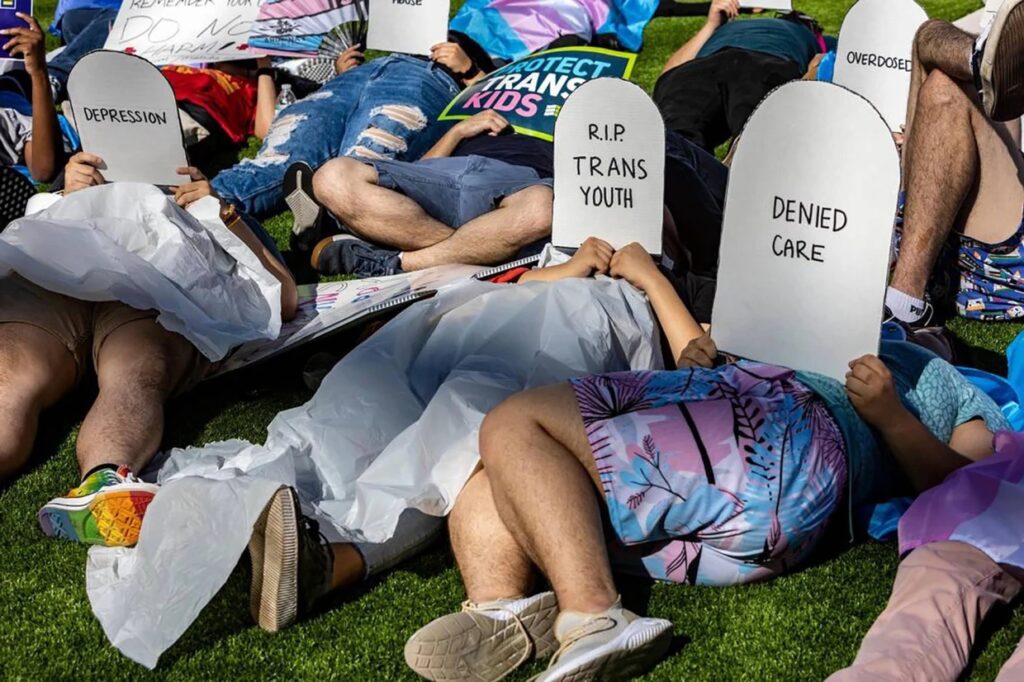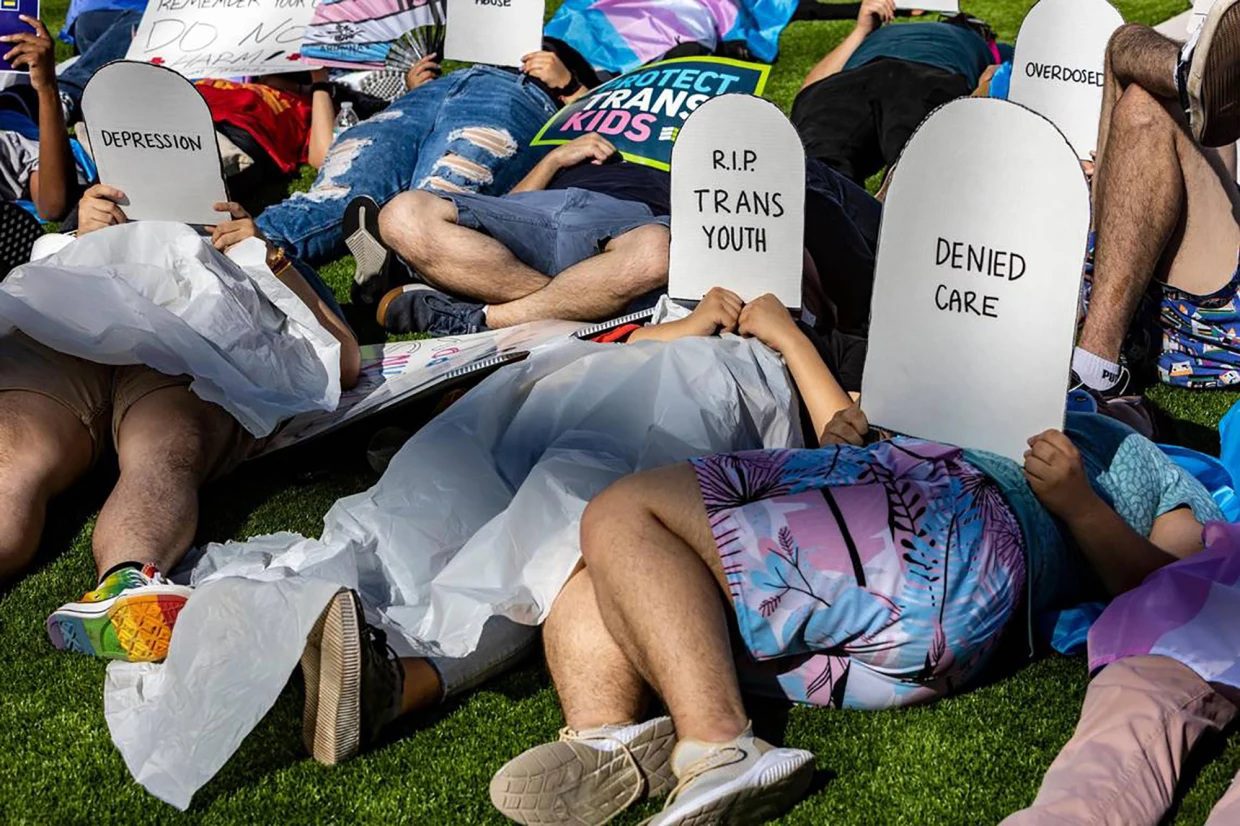By Jo Yurcaba
On March 16, 2023
A group of Florida parents represented by advocacy groups plans to sue to block a Board of Medicine rule that took effect Thursday.

Florida joined seven other states Thursday in restricting transition-related medical care for minors — and parents of transgender youths in the state promptly announced they plan to challenge the measure in court.
After months of tense hearings and debate, the Florida Board of Medicine enacted a rule that bars minors from starting puberty blockers or hormone therapy. Minors who were already receiving the treatment before the date the rule takes effect can continue to do so, although the rule prohibits all minors from receiving gender-affirming operations.
The Florida Board of Osteopathic Medicine will enact an identical rule on March 28.
In joint public hearings for the two rules, Board of Medicine members said there isn’t enough research to justify the potential side effects of the treatments.
At a final public hearing Feb. 10, multiple people said the rule contradicted most medical evidence, as well as guidance from nearly all relevant medical associations in the U.S., including the American Medical Association, the American Academy of Pediatrics and the American Psychological Association. But Dr. Hector Vila, a pediatric anesthesiologist and Board of Medicine member, disagreed, saying the board has “reviewed hundreds of studies.”
“We’ve talked to doctors, we’ve received testimony from both sides of this issue, and the overwhelming data does not support” the use of puberty blockers and hormone therapy, Vila said.
“This board is not against research; it is not against care for transgender children,” he said. “What the board has sought to do is to protect our children from therapies that have been shown to create irreversible harm.”
Under the new rule, anyone can file complaints against health care practitioners, and if the practitioners are found to be in violation of the rule, they could face reprimands, fines or the suspension or revocation of their professional licenses, among other consequences.
The rule is already set to face a legal challenge from a group of parents represented by four national advocacy groups: Southern Legal Counsel, GLBTQ Legal Advocates & Defenders, the National Center for Lesbian Rights and the Human Rights Campaign.
One of the plaintiffs, referred to as Jane Doe in a news release, said the ban will prevent her 11-year-old trans daughter from getting the treatment she will need when she reaches puberty.
“Our daughter is a happy, confident child but denying her access to the medical care recommended by her doctors would completely disrupt her life,” Doe said, according to the release. “I’m devastated by what this will mean for her physical and mental health.”
Another plaintiff, a Florida woman who joined the suit on behalf of her 14-year-old son, said the rule strips “parents like myself of our right to ensure our children receive appropriate, evidence-based medical care.”
“My son was finally getting to a place where he felt hopeful, where being prescribed testosterone was on the horizon and he could see a future for himself in his own body, but that has been ripped away by this discriminatory rule,” she said in a statement. “I am so worried about the impact that lack of access to medical treatment will have on my child. It is every parents’ worst nightmare to have to worry about the unthinkable.”
Florida’s Board of Medicine and Board of Osteopathic Medicine did not immediately respond to a request for comment about the legal challenge.
The rules are part of a broader effort across the administration of Gov. Ron DeSantis to restrict gender-affirming care. In August, after a request from the state Health Department in June, the Florida Agency for Health Care Administration barred Medicaid from covering puberty blockers, hormone therapy and surgery as treatments for gender dysphoria for patients of any age. Civil rights groups challenged the measure, but a federal judge allowed it to stand in October.
In the Legislature, a Senate committee approved a bill Monday that would prohibit minors from starting puberty blockers or hormone therapy or receiving surgery for treatment for gender dysphoria, and it would bar state funds from covering transition-related care for patients of any age. The bill will be considered by another Senate committee and then would still need to pass the full Senate and House before it can be sent to the governor.
The measure would also grant courts jurisdiction in child custody cases “to protect the child from being subjected to sex-reassignment prescriptions or procedures.”
It would allow minors who are already receiving the treatments to continue them but would require that such treatments — including those for adults — be administered by physicians rather than nurse practitioners or other licensed health care providers.
Eight states — Alabama, Arizona, Arkansas, South Dakota, Tennessee, Utah, Mississippi and, now, Florida — restrict transition-related medical care for minors.
So far this year, Florida legislators have filed 10 bills targeting LGBTQ people, according to the American Civil Liberties Union. Nationwide, state legislators have filed more than 400 such bills, according to the ACLU and a separate group of researchers who are tracking the flow of legislation.
Jim Lopresti, the founder SunServe, a mental health service agency in Fort Lauderdale that treats LGBTQ youths, said his practice has already seen the proposed and passed legislation, along with the debate over the Board of Medicine rule, affect families.
“The place where we’re most discovering issues and concerns is the stress on families and on youth, who now find that because of the whole complex of anti-LGBTQ initiatives in Florida, they are finding so few safe places to go,” he said.
Supporters of restrictions on gender-affirming care often argue that minors might regret transitioning later, but Lopresti said that in the roughly two decades that he has worked with trans youths, he can think of only one person who experienced regret as an adult, and it was because the person did not have adequate support throughout the process.
“When we hear about regrets, it’s usually from persons in the trans community who regret that they didn’t do it sooner — that is far more frequent an experience,” he said.
This piece was republished from NBC News.
